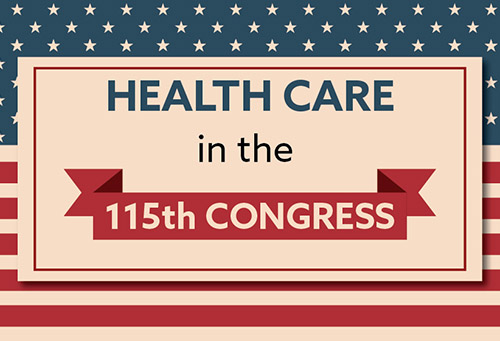
At Risk: Employers’ Health Benefit Tax Exclusion
The debate on the best way to repeal and replace the Affordable Care Act (ACA) is likely to continue to evolve in the hours, days and weeks ahead.
While that debate is underway, employers should speak up to ask federal lawmakers to protect the tax exclusion for employer-sponsored health benefits, according to Katy Spangler. External Link. Opens in new window., senior vice president, health policy, for the American Benefits Council,. External Link. Opens in new window. Washington, D.C.
The Alliance is a member of the Council on behalf of employers who are members of the cooperative. Spangler tailored her presentation on Health Care in the 115th Congress to their interests.
‘Controlling the Agenda’
For those who think repealing and replacing Obamacare should be simple when Republicans have a majority in the House and the Senate, Spangler noted there is a difference between “being in the majority and controlling the agenda.”
The biggest roadblock to a Republican agenda is the slim margin of their Senate majority. In the Senate, 60 votes are required to overcome a Democratic filibuster that could delay or block legislation. The Republicans have 52 votes.
Republicans can avoid a filibuster by using budget reconciliation bills, which can be passed with a simple majority. Reconciliation bills can only be used for items that impact the federal budget, which limits the provisions of the ACA Republicans can repeal or amend.
Spangler said it appeared likely that in the near future, Republicans could use three separate budget reconciliation bills to:
- Repeal the ACA.
- Enact comprehensive tax reform.
- Replace the ACA.
In early conversations, timeframes for the “repeal” legislation stretched as long as two to three years into the future. But recently, Republican senators, President-Elect Trump and others raised concerns about the impact of repealing the ACA without having a replacement ready. That could have a significant impact on the process and the timeline.
Spangler’s slides. External Link. Opens in new window. from the presentation offer a review of the current legislative options under consideration, possible timelines and the impact on employers.
Will Congress Tax Health Benefits?
In a political landscape that is evolving daily, where should employers focus their efforts? Spangler noted that the biggest issue is the potential taxation of employer-sponsored health benefits.
Spangler said all the Republican proposals that are likely to have a significant role in shaping repeal-and-replace legislation seek to collect more taxes by modifying the tax exclusion on employer-sponsored health benefits in some way.
Spangler urged employers to contact Speaker of the House Paul Ryan, a Republican from Janesville, Wis., to urge him to repeal the 40 percent “Cadillac tax” on health benefits and not replace it with a cap on the employee health benefits tax exclusion.
Employers were also encouraged to contact members of the Senate Finance Committee. External Link. Opens in new window.. She noted that this committee is currently looking for employers’ feedback. Spangler said the committee has previously sought out employers’ insights and innovations, which led to Alliance President and CEO Cheryl DeMars’ 2014 testimony before the committee. External Link. Opens in new window. on the QualityPath program.
Tax Proposals that Impact Health Benefits
Changes to the tax treatment of employer-sponsored health benefits could be included in any of the three budget reconciliation bills expected this Congress: repeal, comprehensive tax reform or replacement. Current laws allow employers to exclude the cost of employer-provided health insurance from taxable income.
Options under consideration include:
- Keeping the “Cadillac tax” but modifying the tax amount and creating a “safe harbor” based on a plan’s actuarial value. The ACA imposed a 40 percent excise tax, or “Cadillac tax,” on employer-sponsored coverage that exceeds $10,800 for individual coverage and $29,100 for family coverage when the tax is slated to take effect in 2020. Concerns about proposals to modify the tax include the thresholds set for triggering the tax now and how those thresholds might be adjusted in the future. The Council has worked to repeal the excise tax and continues to oppose it.
- Imposing a cap on the existing employee exclusion for employer-sponsored coverage. For example, the ACA replacement measure introduced by conservative Republicans known as the American Health Care Reform Act would replace the health coverage tax exclusion with a standard health insurance deduction of $7,500 for individual coverage and $20,500 for family coverage. Other proposals that would cap the employer tax exclusion at varying levels include Speaker Ryan’s “A Better Way” proposal and “The Patient Choice Act.”
- Limiting the amount of the employee exclusion based on actuarial levels. Spangler said this approach would be similar to the Cadillac tax in some respects.
Spangler said a top priority of the American Benefits Council is working to ensure that health benefits are not taxed. The market for large employers is currently working well — employer-sponsored health care currently covers 177 million Americans, which compares to 18 to 20 million Americans covered by the ACA’s individual insurance market. Spangler hopes Congress doesn’t risk the benefits of 177 million Americans in order to make health care better for 18 to 20 million Americans.
Employer-sponsored benefits represent “the one market that is actually working very well,” Spangler said.
Employer Priorities
Spangler offered a list of priorities that employers can monitor and influence by contacting federal lawmakers.
- Repealing the Cadillac Tax.
- Maintaining the current tax exclusion of employer-sponsored health coverage.
- Strengthening the uniformity of the Employer Retirement Income Security Act (ERISA), which allows self-funded health plans to follow national ERISA guidelines rather than state mandates. That uniformity has been challenged by some state legislation, such as Michigan’s claims tax on self-funded health plans.
- Minimizing burdensome employer reporting. Spangler noted that any “tax credit scheme” related to individual health coverage would likely include a reporting requirement for employers.
- Focusing on decreasing health care costs, such as current efforts to help the health care system shift payment away from volume to value.
- Increasing flexibility for Health Savings Accounts (HSAs), which provide tax advantages to people enrolled in high-deductible health plans (HDHPs).
- Increasing flexibility for employer-based wellness programs, which were hampered by recent Equal Employment Opportunity Commission lawsuits.
Spangler added that one element of a repeal-and-delay-replacement strategy that worries the Council on employers’ behalf is where the money will come to pay for strategies that “replace” the ACA. The Council hopes that large pieces of the repeal and replace discussion will occur in the same timeframe.
“It’s the best idea to do any new subsidy now so employers aren’t on the hook later to pay for whatever they come up with,” Spangler said.
[box]
Learn More about Health Benefit Taxes
- How will Illinois’ New Managed Care Organization Tax Affect the Health Care Landscape?
- $44 Million Tax Bill Shows Importance of Health Policy Compliance
- Onsite Clinics and HSAs: Convenient, High Value Health Care or Taxable Income?
[/box]






